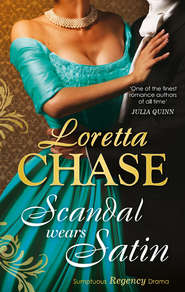По всем вопросам обращайтесь на: info@litportal.ru
(©) 2003-2025.
✖
Vixen In Velvet
Настройки чтения
Размер шрифта
Высота строк
Поля
“I suppose you didn’t realize quite how canny she is,” Swanton said.
“I did not,” Lisburne said. “She’s the very devil of a businesswoman.”
After she’d torn his heart to pieces and cleaned out the display case as well as his purse, she’d very charmingly got rid of him.
“I’m glad you weren’t there,” he told Swanton. “It might have killed you. It nearly killed me when she said, ‘They don’t have Botticelli paintings to look at. If they want beauty in their lives, they have to make it.’ ”
Swanton blinked hard, but that trick rarely worked for him. Emotion won, nine times out of ten, and this wasn’t the tenth time. His Adam’s apple went up and down and his eyes filled.
“Don’t you dare sob,” Lisburne said. “You’re turning into a complete watering pot, worse than any of those deranged girls who follow you about. Pull yourself together, man. You’re the one who proposed to raise funds for Maison Noirot’s favorite charity. I found out all about it for you. I’ve brought you abundant evidence of their work. Do you mean to compose a lugubrious sonnet on the occasion, or may we discuss practical plans?”
“Easy enough for you to talk about pulling oneself together.” Swanton pulled out his handkerchief and blew his nose. “You’re not the one who’s afraid to put a foot anywhere lest he step on a young female. I have to be careful not to hurt their tender feelings, and at the same time not say anything too kind, lest it be construed as wicked seduction.”
“Yes, yes, it’s a hellish job,” Lisburne said. “If you want to go back to Florence or Venice tomorrow, I’ll go with you happily.”
He might as well. What had he to do here but try to keep Swanton out of trouble with swooning girls? Though a grown man, supposedly capable of taking care of himself, the poet tended to be oblivious at times. This made him easy prey for any of a number of unpleasant women, like Lady Bartham’s younger daughter, Alda.
As to Miss Leonie Noirot …
If Lisburne did return to Italy tomorrow, would she notice he was gone, or would she simply find another fellow to intrigue while she set about picking his pockets?
Swanton took up one of the pincushions that had stabbed Lisburne to the heart.
“That’s Bridget Coppy’s work,” Lisburne said. “Miss Noirot says the heart shape is traditional for pincushions. But instead of the usual red, the girl exercised her imagination and made it in white with a coral trim, to set off the colorful flowers. The cord attaches to the waist.”
“The flowers are charming,” Swanton said. “So delicate.”
“Bridget is becoming a skilled embroiderer,” Lisburne said.
“My mother would like this,” Swanton said.
“Then by all means let us deliver it in person. I see gifts aplenty here for my mother as well. And her new husband. They would both be enchanted.”
His mother had chosen her second husband as wisely as she’d done her first. Lord Rufford was a good, generous man, who made her happy. He’d made a friend of his stepson, too, no easy feat.
“You’re in a devil of a hurry to return,” Swanton said.
Lisburne laughed. “Perhaps I am. I’m supposed to be such a cosmopolitan fellow, yet I let a redheaded French milliner get the better of me. Perhaps I want to slink away in shame.”
“That I beg leave to doubt,” Swanton said. “I believe you’re so far from wishing to leave that you’re even now puzzling over how she did it, so that you can plan how to prevail at your next encounter.”
Lisburne looked at him.
“She’s the only woman you’ve taken any particular notice of since we came to London,” Swanton said. “And I know you. As well, that is, as anybody can know you.”
“As though there were anything of great moment to know,” Lisburne said. But Swanton was a poet. He imagined everybody had hidden depths. If Lisburne did have them, he wasn’t interested in exploring them, and he certainly wouldn’t encourage anybody else to do so. “What about you? Do you feel compelled to stay?”
“I feel I must,” Swanton said.
“Do you? I’d as soon be stalked by wolves as by a lot of gently bred maidens.”
“They’ll grow sick of me soon enough,” Swanton said. “In the meantime, I should be a coward to run away when I can do so much good. It would be unworthy of your father’s memory, in any event.”
“Yes, yes, stab me with my father, do,” Lisburne said.
“I know it isn’t fair, but it’s the only way I know to win an argument with you,” Swanton said.
“Very well,” Lisburne said. “We stay until they turn on you. Then we pray we can get away in time.”
He glanced at the piles of correspondence he’d flung onto one of the library’s sofas a short time earlier. “Meanwhile, does your secretary need a secretary? The heaps of letters have only grown higher since yesterday.” Remembering what Swanton had said moments ago, he added, “Begging letters, you said. One of the perils of rank and wealth. Everybody puts his hand out, and somebody has to decide who’s deserving and who isn’t.”
“That’s the least of it,” Swanton said. “Today alone I received two claims for child support and one extortionate note threatening a breach of promise suit.”
To anybody who knew Swanton, the claims were absurd. Yet they oughtn’t to be taken lightly.
Fame aroused envy and greed and, generally, the worst instincts of some people. Too many would be willing to believe ill of him.
“Show me the letters,” Lisburne said.
Evening of Tuesday 14 July
Had Lisburne not been so deeply engrossed in his cousin’s unpleasant correspondence, he might have got wind of the other matter sooner. Or maybe not.
Though he’d been to White’s often enough, he hadn’t looked into the betting book in days. Why bother? So many of the wagers were witless, arising from boredom. How long a fly would crawl about the window before it died or flew away, for instance.
Lisburne, for the present at least, wasn’t bored. Watching women moon about Swanton had been tiresome, and even the possible dangers of the situation hadn’t made life exciting. But then Miss Leonie Noirot had entered the picture, and London had become far more interesting.
Since she was everything but boring, Lisburne wasn’t shocked to find her at the heart of the latest gossip.
He and Swanton had attended the Countess of Jersey’s assembly, where the ladies made the usual fuss about the poet. While the younger women were fluttering about Swanton, Lisburne drifted toward the card room. As he was about to enter, Lady Alda Morris detained him, in order to whisper something behind her fan.
Maison Noirot
Wednesday 15 July
Lady Gladys stood before the dressing glass, her face pink.
Four women—Leonie, Marcelline, Lady Clara, and Jeffreys—watched and waited.
Today, for the first time, Lady Gladys wore the corset Leonie had designed especially for her.
Unlike the one they’d hastily adapted last week to replace the monstrosity she’d brought from home, this one employed all of Leonie’s knowledge of mathematics, physiology, and physics. Until this moment, she hadn’t been allowed to enjoy her accomplishment, because Lady Gladys had refused to come out and show herself in the corset. She said she would not cavort about in her undergarments to be gawked at.
That, however, was before she’d seen the gold evening dress.
When they’d first shown it to her, she’d made a face and said the color would make her look as though she had a liver disease. But by Lady Gladys’s standards, the protest was feeble. A moment later she said she might as well try it on. Then she’d insisted on Jeffreys—the allegedly consumptive speaker of vile French—attending her in the dressing room.
Ladies were nothing if not capricious, but this lady had apparently devoted her young life to making everybody about her want to throttle her.








